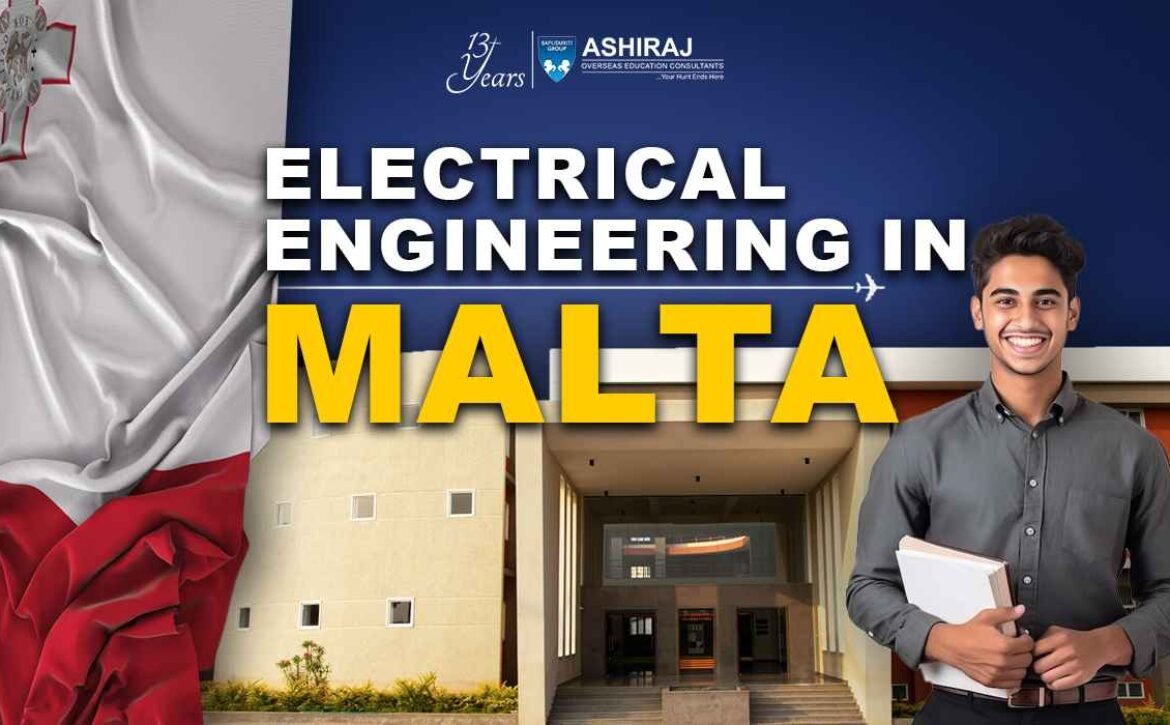
Electrical Engineering in Malta
Electrical Engineering in Malta offers a dynamic pathway for students aspiring to delve into the realms of electrical systems, renewable energy, and telecommunications within the unique Mediterranean context. The field combines theoretical knowledge with practical skills, preparing graduates for diverse career opportunities in Malta’s growing industrial and technological sectors. With a focus on sustainability and innovation, programs in Electrical Engineering in Malta emphasize hands-on learning and research in areas such as power electronics, telecommunications networks, and sustainable energy solutions.
Studying Electrical Engineering in Malta equips students with critical thinking and problem-solving abilities essential for designing and maintaining advanced electrical systems. The curriculum integrates modern technologies and industry-relevant practices, fostering a comprehensive understanding of electrical principles and their applications. Graduates are well-positioned to contribute to Malta’s technological advancements and participate in global engineering initiatives. As Malta continues to expand its infrastructure and embrace sustainable practices, the demand for skilled electrical engineers remains robust, making it an exciting and promising field of study.
Why to Study Electrical Engineering in Malta?
- Strategic Location: Malta’s strategic location in the Mediterranean offers a gateway to Europe and North Africa, providing exposure to diverse engineering projects and industries.
- Advanced Curriculum: Electrical Engineering programs in Malta feature advanced curricula aligned with international standards, integrating theoretical knowledge with practical applications.
- Cutting-edge Facilities: Access to state-of-the-art laboratories and research facilities enhances hands-on learning experiences, crucial for understanding modern electrical systems and technologies.
- Focus on Sustainability: Emphasis on sustainable energy solutions and renewable technologies prepares students to address global energy challenges and contribute to eco-friendly innovations.
- Industry Collaboration: Strong ties with local and international industries facilitate internships, projects, and career opportunities, providing practical insights and networking opportunities.
- Multicultural Environment: Malta’s multicultural environment fosters a rich cultural exchange and diverse perspectives, enhancing the overall educational experience.
- Career Prospects: Graduates of Electrical Engineering in Malta are well-equipped for diverse career paths in sectors such as telecommunications, energy, automation, and consultancy, both locally and globally.
- Personalized Learning: Small class sizes and personalized attention from faculty members ensure a supportive learning environment tailored to individual needs.
Studying Electrical Engineering in Malta not only equips students with essential technical skills but also prepares them to be adaptable and innovative professionals capable of contributing meaningfully to the field on a global scale.
Top Universities to Study Electrical Engineering in Malta
University Name | QS World University Rankings 2023 | Type of University | Average Annual Fees | Programs Offered |
University of Malta | 801-1000 | Public | EUR 1,000 – EUR 2,500 | Electrical Engineering, Telecommunications Engineering, Renewable Energy |
Malta College of Arts, Science & Technology (MCAST) | Not Ranked | Public | EUR 500 – EUR 1,500 | Electrical Engineering Technology, Electronics Engineering |
American University of Malta | Not Ranked | Private | EUR 8,000 – EUR 12,000 | Electrical Engineering, Electronics, Digital Signal Processing |
Global College Malta | Not Ranked | Private | EUR 6,000 – EUR 9,000 | Electrical and Electronic Engineering, Sustainable Energy Systems |
Mediterranean Institute of Management | Not Ranked | Private | EUR 4,000 – EUR 7,000 | Electrical Engineering, Advanced Electronics Engineering |
Studying Electrical Engineering in Malta offers a variety of options across public and private institutions. The University of Malta, a leading public university, provides comprehensive programs in core electrical disciplines and renewable energy. Malta College of Arts, Science & Technology (MCAST) offers practical training in Electrical Engineering Technology, suitable for hands-on learners. Private institutions like the American University of Malta and Global College Malta emphasize modern technologies such as Digital Signal Processing and Sustainable Energy Systems. The Mediterranean Institute of Management offers specialized courses in Advanced Electronics Engineering, catering to diverse career aspirations within the electrical engineering field. These universities not only focus on academic excellence but also provide opportunities for practical experience and industry connections, making them ideal choices for aspiring electrical engineers in Malta.
Course Curriculum for Electrical Engineering in Malta
- Core Subjects: The course curriculum of Electrical Engineering in Malta covers foundational topics such as circuit theory, electronics, and electromagnetism, providing a solid theoretical base.
- Advanced Topics: Students delve into advanced subjects like power systems, control systems, and telecommunications, preparing them for specialized career paths.
- Practical Labs: Emphasis on practical learning through extensive laboratory sessions enhances understanding of concepts and encourages hands-on experimentation.
- Project Work: Engaging in real-world projects allows students to apply theoretical knowledge to practical scenarios, fostering problem-solving skills.
- Industry-Relevant Skills: The curriculum includes modules on renewable energy technologies, digital signal processing, and sustainable engineering practices, aligning education with industry demands.
- Elective Courses: Students can choose elective courses based on their interests, such as robotics, embedded systems, or advanced electronics, tailoring their education to career goals.
- Internship Opportunities: Some programs offer internship opportunities with local industries, providing valuable work experience and networking opportunities.
- Research Focus: Opportunities for research projects under faculty guidance encourage innovation and exploration of cutting-edge technologies in electrical engineering.
The course curriculum of Electrical Engineering in Malta ensures a comprehensive blend of theoretical knowledge, practical skills, and industry exposure, preparing graduates to tackle complex engineering challenges in diverse sectors globally.
Eligibility Criteria & Admission Requirements for MS in Electrical Engineering in Malta
- Academic Qualifications: Eligibility criteria for Electrical Engineering in Malta typically require a high school diploma or equivalent with strong grades in mathematics and physics.
- Language Proficiency: Applicants must demonstrate proficiency in English through either an IELTS score of 6.0 or above or a TOEFL score of 80 or above. Below is the table format for IELTS/TOEFL scores:
Test | Minimum Score |
IELTS | 6.0 |
TOEFL | 80 |
- Standardized Tests: Depending on the university, applicants may need to submit GRE or GMAT scores. Here are the marks required:
Test | Minimum Score |
GRE | V: 150, Q: 160, AWA: 3.5 |
GMAT | 550 |
- Passport & Student Visa: International students must possess a valid passport and obtain a student visa to study in Malta. The visa process requires fulfilling specific requirements set by Maltese immigration authorities.
- Academic Certificates: Copies of academic transcripts, certificates, and diplomas from previous educational institutions must be provided as part of the application process.
- Work Experience: While not always mandatory, relevant work experience in electrical engineering or related fields can strengthen an application, particularly for advanced or specialized programs.
Meeting these eligibility criteria ensures that prospective students are academically prepared and equipped to pursue Electrical Engineering studies in Malta, facilitating a smooth transition into the academic and cultural environment of the country.
Documents Required for Studying Electrical Engineering in Malta
- Passport: A valid passport is essential for international students applying to study Electrical Engineering in Malta, verifying their identity and nationality.
- Letters of Recommendation (LOR): Typically, applicants need two LORs from academic or professional referees who can attest to their skills, character, and potential for success in the program.
- Statement of Purpose (SOP): A well-written SOP outlining the academic background, career goals, and reasons for choosing the program in Malta is required to assess the applicant’s motivation and suitability.
- Curriculum Vitae (CV): A detailed CV highlighting educational qualifications, work experience, skills, and achievements provides a comprehensive overview of the applicant’s profile.
- Official High School Transcripts & Certificates: Copies of transcripts and certificates from high school or equivalent education must be submitted to verify academic performance and eligibility.
- Work Experience Certificate: If applicable, a work experience certificate detailing relevant professional experience in electrical engineering or related fields strengthens the application.
- Proof of Financial Resources: Evidence of adequate financial resources to cover tuition fees, living expenses, and other costs during the study period in Malta is required for visa purposes and enrollment.
Submitting these documents ensures that applicants meet the requirements and present a strong case for admission to Electrical Engineering programs in Malta, facilitating a smooth application process and transition into academic life.
Admission Process for Electrical Engineering in Malta
- Application Submission: Complete the online application form on the university’s website, ensuring all required fields are accurately filled with personal and academic details.
- Document Submission: Gather and submit essential documents including transcripts, certificates, passport copy, LORs, SOP, CV, and proof of language proficiency (IELTS/TOEFL) and standardized test scores (GRE/GMAT).
- Application Fee: Pay the non-refundable application fee as specified by the university, typically through online payment methods.
- Review Process: The university reviews the submitted applications, assessing academic qualifications, test scores, and supporting documents to determine eligibility for the program.
- Interview (if required): Some universities may conduct interviews to further evaluate candidates’ suitability for the Electrical Engineering program.
- Offer of Admission: Successful candidates receive an offer of admission outlining conditions, such as fee payment deadlines and acceptance confirmation.
- Acceptance and Enrollment: Accept the offer by the specified deadline and complete enrollment procedures, which may include paying tuition fees, obtaining a student visa, and attending orientation sessions.
- Commencement of Classes: Begin classes according to the academic calendar, participating in orientation activities and initial coursework.
Following these steps ensures a systematic approach to securing admission to Electrical Engineering programs in Malta, preparing students for a rewarding educational journey in a vibrant Mediterranean setting.
“Education is the most powerful weapon which you can use to change the world.”
Nelson Mandela
Cost of Electrical Engineering Course in Malta
- Tuition Fees: The cost of studying Electrical Engineering in Malta varies by institution. Public universities generally have lower tuition fees ranging from EUR 1,000 to EUR 2,500 per year, while private institutions may charge between EUR 6,000 to EUR 12,000 annually.
- Living Expenses: Estimated living costs in Malta, including accommodation, food, transportation, and personal expenses, range from EUR 8,000 to EUR 12,000 per year depending on lifestyle choices and accommodation type.
- Additional Costs: Students should budget for textbooks, study materials, health insurance, and miscellaneous expenses, which can amount to approximately EUR 1,000 to EUR 2,000 per year.
- Scholarships and Financial Aid: Some universities offer scholarships, grants, or financial aid opportunities based on academic merit, financial need, or specific criteria. Students are encouraged to explore these options to offset tuition and living expenses.
- Part-time Work: International students with a valid student visa can work part-time during term-time and full-time during holidays, which can help supplement living costs.
Understanding the cost structure associated with studying Electrical Engineering in Malta allows prospective students to plan their finances effectively and make informed decisions about pursuing their academic goals in this Mediterranean country.
Scholarships for Electrical Engineering Courses in Malta
Scholarship Name | Amount | Application Deadline |
University of Malta Scholarships | EUR 1,000 – EUR 5,000 | Varies by program |
Malta Government Scholarships | Full tuition coverage | April 30th |
American University of Malta Scholarships | EUR 2,000 – EUR 8,000 | June 15th |
Global College Malta Excellence Scholarships | EUR 3,000 – EUR 10,000 | July 1st |
Mediterranean Institute of Management Scholarships | Partial funding available | August 15th |
Scholarships for Electrical Engineering in Malta offer financial support to eligible students based on academic merit, financial need, or specific criteria set by the sponsoring institutions. The University of Malta provides a range of scholarships with varying amounts and application deadlines depending on the program. Malta Government Scholarships cover full tuition fees for selected candidates, with an application deadline of April 30th annually. Private institutions like the American University of Malta and Global College Malta offer merit-based scholarships ranging from EUR 2,000 to EUR 10,000, with deadlines typically in June and July. The Mediterranean Institute of Management also provides partial funding opportunities with an application deadline in mid-August. Prospective students are encouraged to explore these scholarship options to help finance their studies in Electrical Engineering in Malta effectively.
Career Opportunities After Electrical Engineering in Malta
Job Profile | Average Salary |
Electrical Engineer | EUR 25,000 – EUR 35,000 annually |
Electronics Engineer | EUR 22,000 – EUR 30,000 annually |
Renewable Energy Consultant | EUR 30,000 – EUR 40,000 annually |
Telecommunications Engineer | EUR 28,000 – EUR 38,000 annually |
Project Manager | EUR 35,000 – EUR 45,000 annually |
Career opportunities after completing Electrical Engineering in Malta offer diverse roles in sectors such as engineering firms, telecommunications companies, renewable energy projects, and more. Electrical Engineers typically earn between EUR 25,000 to EUR 35,000 annually, while Electronics Engineers and Telecommunications Engineers can expect salaries ranging from EUR 22,000 to EUR 38,000 per year. Those specializing in Renewable Energy consulting may earn higher salaries, averaging between EUR 30,000 to EUR 40,000 annually. Project Managers in the field of Electrical Engineering command salaries ranging from EUR 35,000 to EUR 45,000 annually, reflecting their leadership and organizational roles. These positions not only provide competitive salaries but also opportunities for career growth and professional development in Malta’s expanding engineering and technology sectors.
Frequently Asked Questions About Electrical Engineering in Malta
Admission typically requires a high school diploma, language proficiency (IELTS/TOEFL), and sometimes standardized test scores (GRE/GMAT). Specific requirements vary by university.
Yes, several universities and the Maltese government offer scholarships based on academic merit, financial need, and other criteria. Deadlines and eligibility criteria vary.
Tuition fees range widely, from EUR 1,000 to EUR 12,000 per year depending on whether the university is public or private.
Yes, international students with a valid student visa can work part-time during term-time and full-time during holidays.
Graduates can pursue careers as Electrical Engineers, Electronics Engineers, Renewable Energy Consultants, Telecommunications Engineers, and Project Managers, among others.
Most undergraduate programs take around 3 to 4 years to complete, while master’s programs usually take an additional 1 to 2 years.
International students are typically required to demonstrate proficiency in English through tests like IELTS (minimum score of 6.0) or TOEFL (minimum score of 80).
Yes, many programs offer opportunities for practical training, internships, or industry projects to gain hands-on experience.
Malta’s universities maintain high standards of education and are recognized internationally, ensuring quality education in Electrical Engineering.
Documents typically include a valid passport, admission letter from the university, proof of financial resources, health insurance, and sometimes a police clearance certificate.




